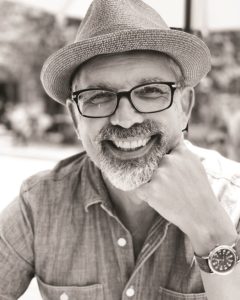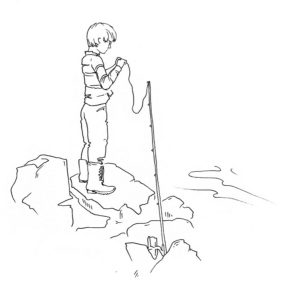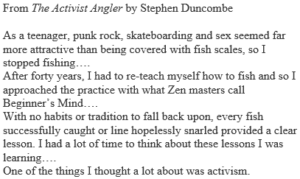When Stephen Duncombe started walking to the ponds and jetties of Cape Cod a few years ago, he didn’t plan on doing anything besides starting the long project of teaching himself again how to fish.

Duncombe is a lifelong activist and educator, and the pandemic had put his usual in-person organizing and teaching on hold. But as he spent long days on the water, he began making connections between the disparate parts of his life — and later, when he corresponded with fellow activists seeking his advice, he found himself increasingly using his fishing experience as a metaphor.
“Because I was fishing so much during that time, I naturally drew lessons from it as I was speaking to activists in West Africa and in the western Balkans,” he says. “I found that people listened to what I was saying and connected to it more. And it would stick with them.”
Duncombe is a professor of media, culture, and communications at New York University’s Gallatin School and a part-time Truro resident. He’s also co-founder of the Center for Creative Activism, an organization that trains activists worldwide. He is the author, with Steve Lambert, of The Art of Activism: Your All Purpose Guide to Making the Impossible Possible and of Dream or Nightmare: Reimagining Politics in an Age of Fantasy.
Duncombe’s latest book, The Activist Angler, came out of his fishing experiences. It constitutes a kind of pedagogy that invites readers to learn with him as he draws parallels between his activist and his outdoor lives. The book was published this month by OR Books and can be ordered from the publisher; it will be available in stores in April.

Each of the book’s chapters connects an element of fishing to an aspect of activist work, from identifying an audience and understanding its vocabulary to using setbacks and successes alike as lessons for the next collective action. In one chapter, Duncombe uses the distinction between surf fishing, where one fights the current, and pond fishing, where the angler must slowly entice the fish to take the bait, to demonstrate how both flashy media stunts and patient, long-term community organizing are necessary to achieve change.
Similarly, Duncombe draws a parallel between knowing where people stand on a particular issue — whether they need to have their awareness raised or be pushed toward a particular action — and a fish’s swimming depth: “To catch a fish you have to reach the fish,” he writes, “and this entails knowing how deep they are swimming.” Each chapter’s comparison is accompanied by an illustration by Duncombe’s niece, Elle Azul Duncombe-Mills.
Duncombe, 57, started coming to the Outer Cape to spend time with his activist mentors. Over dinners, they would reminisce about their work with Students for a Democratic Society in the 1960s. Duncombe’s own activist career began in the 1990s when he started organizing as a student and working with the Lower East Side Collective, a community group focused on gentrification and rent control. He became involved with a subgroup of the collective called the Ministry of Love that was tasked with making activist life more fun.

“As we grew as an organization, gained more members, racked up more victories, and sustained more losses,” he says, “we came to realize this play group was what made the other working groups function.”
The idea of creative play as an integral part of activism is central in Duncombe’s new book. Reflecting on his observations of how fish react to his lures, Duncombe explains how activists can creatively circumvent the confirmation biases that lead some audiences to dismiss collective action. By staging “protests that don’t look like protests” — like a public marriage ceremony in Chongqing, China in which guests donned gas masks to protest air pollution — Duncombe says that activist groups can break the familiar “protest pattern” and create opportunities for renewed interaction with familiar subjects.
Another theme of The Activist Angler is the necessity of making activism rewarding in and of itself. Duncombe emphasizes that activist work is a long haul: a lifelong path rather than a series of challenges to be “won.” He believes that one of the most important elements of being able to sustain one’s own participation in activism is embracing it as work you do for its own sake, whether or not you get a bite — just as in fishing.
Adaptability is also key: the willingness to change one’s approach and mindset to fit one’s audience, just as an angler must change his or her position or selection of lure to attract the right fish. Recalling an experience working in South Africa with a group organizing sex workers, Duncombe reflects on how much he has learned from his students.

“At first, I thought, ‘I don’t get this action at all!’ ” he says. “It was very particular to sex work and to South Africa. But the people that it sought to engage understood it, and that was the important thing.”
More recently, Duncombe has been considering how he increasingly finds that his perspective does not always reflect the audiences he’s trying to educate or the mainstream that his students are trying to galvanize — and how important it is to embrace these shifts as an organizer.
“After forty-odd years of being an activist, of being someone who teaches activists with assurance and authority, I am no longer the center of activism,” he writes. “Personally, it’s uncomfortable. Politically, it’s about time.” And Duncombe says that his fishing experience has illuminated those changes, too: even if he feels as if he’s still doing the right thing, sometimes the person next to him is catching more fish.



